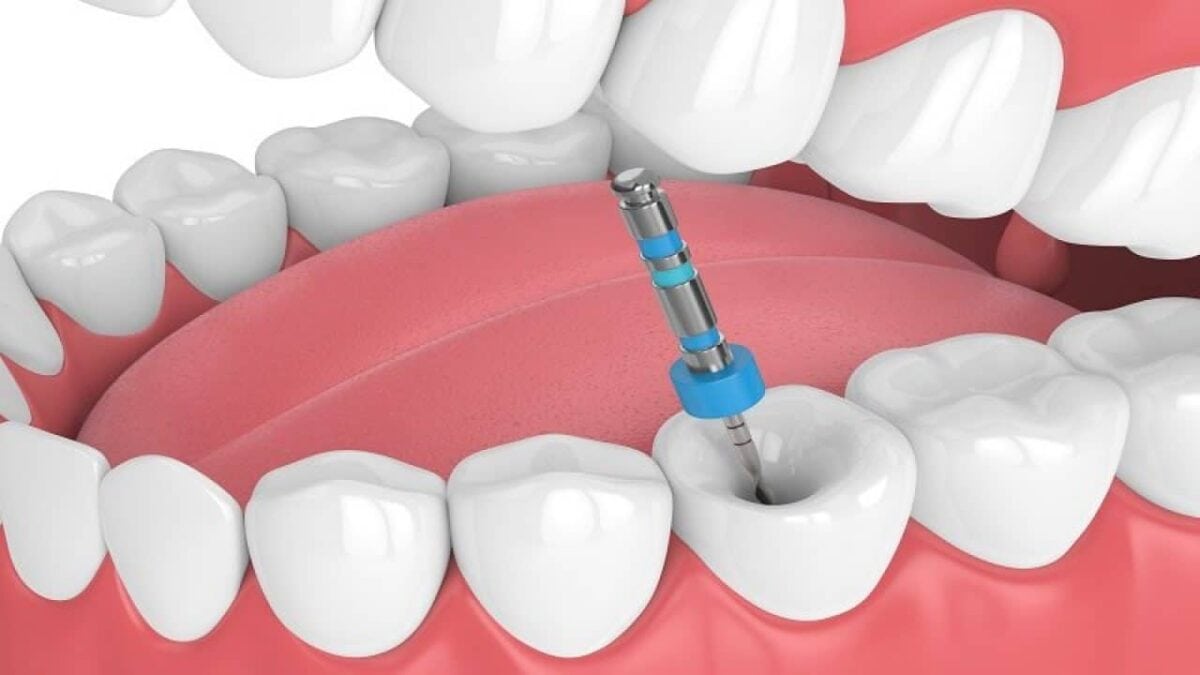The Most Common Myths and Facts about Root Canals
The routine root canal is feared more than any other type of dental procedure. The words alone are enough to send shivers up the spine of a grown adult. Every year, thousands of people who desperately need one to fix a serious cavity or alleviate severe toothache choose to avoid them altogether.
As a nation, we simply do not like them and we instantly panic if the term ‘root canal’ makes an appearance during a check-up or examination. Despite this, it is quite rare for patients to report bad experiences during root canal treatments. For most, there is no pain at all. In fact, the procedure can be surprisingly relaxing.
While being probed with a needle and suction tool is not a typical image of serenity, the point is that modern root canals are likely to be more boring than terrifying. In most cases, anxiety about this kind of treatment stems from its complexity. Clearly, it is important for grown-up patients to fully understand what will happen during a root canal, but this does not mean that the knowledge cannot end up being detrimental in the long run.
In other words, the awareness of what is happening (or what will happen) is a hundred times scarier than what actually does occur. So, the next time that you are confronted with the words ‘root canal’ and it is clear that escape is no option, it is time to get brave and stand up to the fear. The procedure is not the problem, because what hurts is nothing but your expectations.
Conquering Your Fear of the Dentist
As aforementioned, it is important to be aware of what will happen during the treatment. In some cases, this knowledge actually makes patients feel more in control. It dispels many of the misconceptions and myths surrounding the procedure and it allows them to approach it from a rational perspective. For others, the words ‘drill’ and ‘needle’ are where the fear lies.
This can make it difficult to get informed about root canals, because anxieties about the tools and the instruments obscure the truth of the situation; which is that root canals are almost always entirely painless. If you are struggling with a genuine fear or phobia of the dentist, it could be helpful to schedule a non-invasive consultation with your specialist.
You can make it clear that no contact should be made during this session and that you only want the chance to ask questions and familiarize yourself with the procedure. In fact, even just being in a surgery room at your local dentist will likely ease your nerves. You are much more likely to feel comfortable if you are waiting for an appointment in an environment that you have recently experienced. This is why turning up for root canals after years of missed check-ups can be very scary.
You should never be afraid to express your apprehension to the dental specialist. If he or she is aware that you are feeling vulnerable, they can take a little more time with the procedure and be especially gentle when approaching with drills and other tools. Ultimately, if you do not speak up, they will not know how to help you, so voice your concerns. Also, deep breathing, squeezing a stress toy, and listening to earphones can all help alleviate anxiety.
Understanding the Basics of the Root Canal
There are a number of different reasons why a patient may need a root canal treatment. The most common are cracked and damaged teeth, deep cavities, an abscess, or trauma from previous (poorly performed) dental procedures. A root canal is carried out to repair the root of a tooth that has become infected or inflamed.
As the infection builds, bacteria begins to accumulate around the root of the tooth. Clearly, this is a big problem. If left untreated, this can lead to severe pain and the degeneration (and eventually loss) of teeth. In some cases, it is clear that a root canal is needed, because a painful swelling has developed in the face, around the affected tooth. If this happens, you are advised to consult a dentist as soon as possible.
During the procedure, the dentist removes the fluid around the root of the tooth and the bacteria that it contains. However, in order to do this, they have to drill a small hole through the tooth itself. This is one of the reasons why so many patients dread the treatment, even though they cannot feel the drill penetrate the enamel (an anesthetic is used). Once a hole has been made, a special tool is inserted and used to widen the passage.
Then, a suction tool (kind of like a miniature hoover) is used to suck up all of the infected fluid and decaying dental pulp. Ultimately, the inside of the tooth ends up empty, so the dentist then has to fill it with a special substance called gutta percha. This material gives the empty tooth strength and structure and makes sure that bacteria cannot enter. It is usually replaced, at a later date, with a more permanent solution like a filling or crown.
And that is a root canal. It might sound complex, but dentists perform them all the time. Here are a few of the most common myths and misconceptions about the procedure.
-
Root Canals are Painful
It is very rare for a root canal to be a painful treatment, because sophisticated anesthetics are used to make sure that this does not happen. In reality, root canals are designed to relieve pain. If an abscess or serious cavity has developed, there is likely to be a lot of dental pain and this is often the most suitable way to treat and remove it.
The misconceptions about painful root canals originated at a time when anesthetics were not available. Of course people back in the seventeenth century were frightened of having infected teeth treated – they felt everything! Today though, this is simply not the case. If performed correctly, a modern root canal should feel much like having a regular filling. The only difference being that root canals take a lot longer to complete.
-
Root Canals are Too Expensive
This is a difficult myth to dispel, because every dentist has their own rates. There are some root canals that are very pricey and others that are much cheaper than expected. So, the truth of this one is really down to your choice of specialist and surgery. It is a misconception, however, to believe that all root canals are very expensive.
In most cases, this type of treatment is pricier than more routine procedures like fillings. It takes longer, it is more complex, and requires more dental skill. Then again, root canals are usually cheaper than having a tooth extracted and replaced with a tailor made bridge. In the end, the treatment is going to help you avoid having to make repeat visits, with persistent tooth troubles, so it is a sound investment.
-
The Tooth Pain Will Vanish Immediately
Yes, root canals alleviate dental pain. However, no treatment comes without a little swelling and sensitivity immediately after the fact. If you have had a dentist poke around in your mouth with drills and needles, your gums and teeth are bound to be a little sore. This pain should be mild and very short lived. For most patients, minor aches and sensitivities are gone within a few weeks after treatment.
After this point, you should have no pain whatsoever. The ache in the infected tooth will be gone, because the bacteria has been removed. Your dentist may advise you to take a mild painkiller to help with post-treatment soreness. If you do take over the counter medications, make sure that you do not drive or drink alcohol; many of these drugs cause drowsiness.
-
Root Canals are Likely to Fail
Once again, this may have been true fifty years ago, but the root canal has come on leaps and bounds in recent decades. Now, the rate of lifetime success (as regards longevity of a root canal) is a remarkable 85%. So, while nobody can guarantee that you will not develop a problem later or need a crown or filling replaced, the chances of this happening are low.
If a root canal does get infected again in later years, there is every chance that a dentist can repair and treat it. In some cases, especially if there is a fracture or severe decay, the tooth may need to be extracted. If this happens, there are plenty of option for replacement. You will not be left with a gap, because this will accelerate the degeneration of surrounding teeth.
-
Teeth Remain Sensitive Afterwards
Once the swelling and soreness has subsided, there should be no pain or sensitivity around the treated tooth. If pain persists, you need to consult your specialist as soon as possible. It may be that there are concealed root canals that still need removing or a hidden problem that the dentist could not identify during the treatment.
Once again, this is quite rare, so do not worry about it unless it happens. Even then, all that you have to do is revisit the dentist and they will advise you on the next best step. If the root of the tooth has become so severely damaged that it cannot be saved, your specialist will likely recommend an extraction.
-
Root Canals Kill the Nerves Inside Teeth
There is a little truth and a lot of misconception in this myth. While a root canal does remove the nerves located inside the tooth, these do not have an essential function once all of the adult teeth have developed. The reason why root canals cannot be performed in young patients are because the nerves drive the growth of adult teeth.
Once they have stopped growing, the nerves are only a ‘first alert’ defense mechanism. They react to stimulus and tell the owner of the teeth whether there is a problem, by causing aches and pains. Clearly, if a root canal is needed, the alert system has worked. However, the nerves are not really needed if the root is damaged enough for the tooth to require emptying. In other words, the tooth simply does not miss them.
-
Powerful Painkillers are Needed
This will depend entirely on how much pain you are feeling, but considering it is quite unusual to be in severe pain after a root canal treatment, common painkillers should be more than enough. The most common drugs taken for post-treatment aches and soreness are Tylenol, Advil, and Motrin. As aforementioned, the pain should be mild and vanish after 1-2 weeks after the root canal procedure.
If you are at all unsure about taking certain medications, consult your dentist first. This is particularly important if you are already taking prescription drugs for an unrelated condition or if you are pregnant, breast feeding, or have any serious allergies. It is always best to check if you are not sure. It never hurts to pick up the phone and have a ten minute chat, after all.
-
Root Canal Patients Need a Crown
This is true for most root canal patients. In fact, it is very unusual for a dentist not to ask a patient to come back for follow up repairs. In some cases, a post and crown can be fitted immediately after the root canal, but since it is quite a lengthy treatment on its own, most schedule it separately. You may be prescribed a filling instead of a crown, but the end result is pretty much the same.
The filling or the crown is required to give the empty tooth strength and to prevent it from becoming infected again. Essentially, once you have had a root canal, a filling should feel like the easiest treatment in the world, because it is so much quicker to complete. Before you start any kind of treatment, it is a good idea to talk with your dentist about what is likely to be required of you afterwards and how best to care for your tooth in the interim.
-
Root Canals Take Ages to Complete
As already made clear, root canals are one of the lengthiest treatments. However, in recent years, dental developments have brought this timeframe right down. So, most procedures are finished within a couple of hours. It does depend on the condition of your tooth, because in cases where the root is severely infected, the dentist will usually insert an antibacterial substance into the tooth first and perform the treatment at a later date.
If there is no serious infection or added complications, the root canal is likely to be completed within a single appointment. This is not usually counting crowns and fillings, though if you get very lucky, you may be able to go home with the full process done and dusted within the space of a single visit. Again, your dentist should be able to give you a good idea of what will be required after examining your mouth.
-
Failed Root Canals Need to Be Extracted
If you have a root canal and it becomes infected again years down the line, the first option is not always a full extraction. Your dentist will take a close look at the tooth and decide what the best course of treatment will be. For most patients, a thorough clean and the removal of infected fluid is required (in other words, a second root canal).
In a small number of cases, an apectomy may be performed. This is a type of microsurgery designed to remove the tip of the dental root. It is not the standard way to respond to re-infection, but it can be a good alternative to extraction. These days, dentists go to great lengths to save teeth at all costs, because gaps can accelerate the degeneration of surrounding tissues and teeth. So, the infected tooth will only be removed if there is no other viable option.
-
Infections After Treatment are Common
The incidence of re-infection, following root canal treatments, is neither unusually high nor unusually low. To be precise, there is a very good chance that it will not happen, but if it does, there is nothing unusually serious or urgent about it. If infection returns, however, further treatment is definitely needed. In fact, the only real downside to root canals is that there is no way to entirely prevent infections from returning.
There are only so many materials that a dentist can use to safely fill the empty tooth structure and none of them can guarantee a barrier for bacteria. The good news is that major breakthroughs are being made all the time. At the moment, dental scientists are testing the use of nanodiamonds in gutta percha as a way to reduce the likelihood of infection. It is thought that this material, when inserted into gutta percha, significantly reduces invading bacteria.
-
Root Canals Cause Physical Sickness
This is one of those lingering (and very damaging) myths that, for some reason, seems to persist in online circles. The fact of the matter is that no piece of scientific research has ever found a link between root canals and physical disease or sickness. The argument is that emptied tooth structures can become infected (as we know, this part is true) and that this bacteria can lead to illness in other parts of the body (this is untrue).
There is simply no evidence to suggest that bacteria in the tooth cause any kind of sickness. In fact, even healthy teeth are filled with bacteria – they are a natural part of the mouth. So, it really doesn’t make any sense to think that a root canal could lead to physical maladies in other parts of the body. If you do feel anxious or unsure about moving forward with a root canal treatment, talk to your dentist about these fears. It is their responsibility to dispel and unravel some of these harmful misconceptions.
How to Prepare for a Root Canal
The single best way to prepare for a root canal treatment is to do everything that your dentist ask of you. If they prescribe antibiotics or a certain painkiller, take them. It is usually acceptable for patients to take a dose of a non-steroidal anti-inflammatory (ibuprofen, for instance) before the root canal begins, but do check with your specialist that this is okay. If you are allergic to any medications or have any other health problems, inform your dentist as soon as possible.
The evening before the appointment, go to bed at a reasonable time. That way, you will wake well rested and ready to approach the treatment with a positive outlook. If you are tired or stressed about other issues, you are bound to feel more uncomfortable. Oh, and do not forget to eat before your appointment too. This should be something light, like a sandwich or a salad.
A lot of patients assume that they should fast before a dental procedure, but there is no need for this. In fact, eating normally will ensure that you feel relaxed and happy to proceed with the root canal treatment. Generally, it is okay to eat up to an hour before the appointment. Any later and you risk confronting your dental specialist with a mouth full of morsels. If possible, avoid sugary drinks, coffee, and candy.
And last but not least, do not beat yourself up about feeling scared. The vast majority of patients feel some degree of apprehension, worry, or fear, so you are not alone. The best advice is always to get vocal and talk about it. The more that your dentist understands about you, the more personalized their approach can be. Remember, don’t be embarrassed or ashamed of the state of your teeth – they have almost certainly seen worse.
Author: Carefree Dental
Article originally appeared at: https://www.carefreedental.com/



